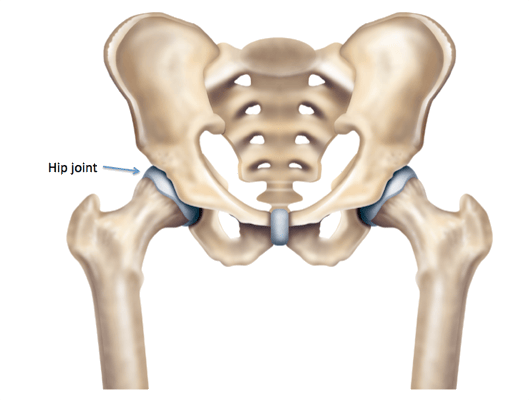Hip arthritis
Arthritis of the hip refers to damage to the smooth cartilage which normally lines the ball and socket joint of the hip. This can be caused by wear and tear, as a result of a previous injury, or can come on for no obvious reason. It sometimes runs in families. It typically affects people in their 60s and 70s, but not uncommonly affects younger adults. When the cartilage wears down to bare bone the condition becomes serious.

“Prompt appointment and really helpful follow up. Communication from Dr Willis-Owen was great, he went out of his way to ensure I was treated as quick as possible. Definitely worth the money to put mind at ease so quickly. Thankyou.
About the hip and arthritis
Arthritis of the hip refers to damage to the smooth cartilage which normally lines the ball and socket joint of your hip. This can be caused by wear and tear, as a result of a previous injury, or can come on for no obvious reason. It can certainly run in families. It often affects people in their 60s and 70s, but can also happen in younger adults especially sportspeople. When it is worn down to bare bone it becomes serious.
New research suggests that certain shapes of the ball and socket joint may be more likely to develop arthritis. In men ‘cam’ shaped hips where the ball is not perfectly round can contribute. In women ‘pincer shaped’ hips where the socket is too deep can cause problems. By the time you have developed hip arthritis this distinction is not very helpful, it’s just plain painful!

Hip pain – what does it feel like?
You will experience pain in the groin, at the front, and most people don’t realise this is the hip. You may feel it on the outside of the hip and down the thigh too. To start with this is worse with activities, typically walking. You may notice some stiffness and reduced movement. With time bending down can become difficult, and putting on shoes may be hard work. It may be bad to sit for a long time, and stiff when you first get moving again. The pain is typically a dull aching toothache type pain. In the early stages it will feel better with anti-inflammatories or painkillers, but as it gets worse these become less effective.
Pain in the buttock is often assumed to be hip arthritis, but this is more commonly caused by problems with the back. Sometimes it can be quite difficult to distinguish between the two. X-ray, scans or injections may be used to get the right diagnosis. Sometimes hip arthritis can even make you feel pain in your knee!
What will you do?
The most important thing, to begin with, is understanding what the problem is and what you can do about it. This is where I come in. We will get an X-ray and quite often a special sort of MRI scan depending on what I think when I have heard your story and examined you. The main thing to decide is whether it is hip arthritis, a soft tissue problem in the hip (such as a cartilage tear or acetabular labrum tear) or a back problem.
In the early stages of hip arthritis I may suggest changing some of your activities and doing some specific physiotherapy. Sometimes I will say it’s ok to use painkillers for sports, or even for more seasoned patients walking aids such as sticks can be helpful to keep you enjoying your walks. As the condition progresses I can use injections to keep the pain and stiffness away, but for the hip, these have to be administered in the operating theatre under a quick anaesthetic.
Do I need a Hip replacement?
Sadly over the years, if it really is hip arthritis, it will eventually affect your mobility and your walking. It can impact on your lifestyle, and make you miserable. It may become painful at night-time and keep you awake at night or wake you up from sleep. When the symptoms reach this level it is time to consider having surgery in the form of a hip replacement.
The hip replacements that we use today are very sophisticated pieces of metal and plastic or ceramic. The technology used is improving all the time, and this is generally a very successful, long-lasting procedure. Hip replacements do still have a finite lifespan, but there are a variety of options for very long-lasting hips. Recently an alternative to hip replacement called hip resurfacing became popular. This has recently fallen out of favour due to problems with metal on metal bearings.
If done well, by an experienced surgeon, then hip replacement has very high success rates and is long-lasting. There are a number of choices to make about your surgery and your implant which will depend on your personal details. Hip replacements can be cemented, or un-cemented and the moving parts may be made of metal, plastic, or ceramic, in a variety of combinations.
I used to do hip replacements, but I now specialise purely in knees. Better to be an expert in one thing than a jack of all trades. If it gets to the stage that you need a hip replacement I will refer you on to the best person for you. I don’t do hip replacements myself.
“Prompt appointment and really helpful follow up. Communication from Dr Willis-Owen was great, he went out of his way to ensure I was treated as quick as possible. Definitely worth the money to put mind at ease so quickly. Thankyou.
Can I do sport with a Hip Replacement?
Yes, you can! When I used to do hip replacements I got lots of people back to sport, and I have just finished reviewing a scientific study about exactly that. It is possible and safe for most sports but it may reduce the lifespan of your hip replacement, so it is a personal choice and trade-off between how much you enjoy life and how long that hip lasts! Some surgeons say you must never do sport but you have to wonder if they are protecting their figures or your quality of life (we get judged on out ‘revision’ or reoperation rates, not on your happiness)!
If you have had a hip replacement and want to discuss sports with me then get in touch.
Book a consultation